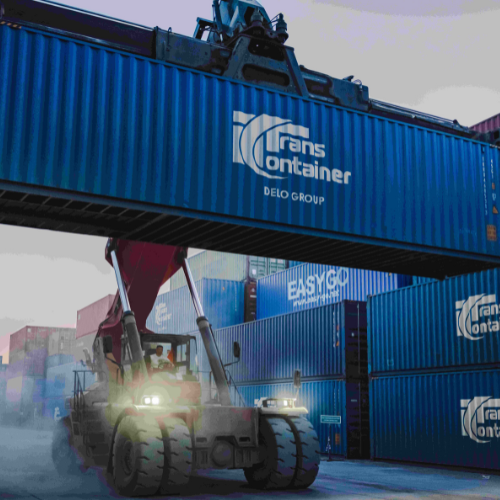The European Union has taken decisive action against PJSC TransContainer, Russia’s largest railway container operator, by imposing sanctions due to its alleged involvement in illegal arms trade with North Korea. These sanctions mark a significant escalation in the EU’s efforts to disrupt Russia’s military activities, particularly its support for North Korea amid the ongoing conflict in Ukraine.
Allegations and Accusations Against PJSC TransContainer
PJSC TransContainer stands accused of facilitating munitions transfers from North Korea, actions that pose a direct threat to Ukraine’s stability and territorial integrity. According to the European Council, TransContainer’s shipping containers were identified in both Rason, North Korea, and an arms depot in Tikhoretsk, Russia, located just 400 kilometers from Ukraine’s border. This depot reportedly supports operational munitions storage for the Russian armed forces, potentially enhancing Moscow’s military capabilities near the Ukrainian front.
Political Implications
The European Council’s decision to sanction PJSC TransContainer is rooted in broader geopolitical concerns, linking the company’s activities to Russia’s annexation of Crimea and ongoing destabilization efforts in Ukraine. By targeting TransContainer and its CEO, Mikhail Kontserev, the EU aims to hold accountable those allegedly facilitating Russia’s military actions and supporting its geopolitical strategies through illicit means.
International Response
In response to these allegations, the EU has implemented stringent measures, including freezing assets belonging to TransContainer and Kontserev within EU jurisdiction. This move effectively prohibits any financial transactions involving EU citizens or companies with the sanctioned entities. Furthermore, Kontserev is now banned from entering or transiting through EU member states, further isolating him and restricting his engagement with European markets.
Coordinated International Efforts
The EU’s sanctions on PJSC TransContainer parallel actions taken by the United States, which earlier sanctioned the company over reports linking its cargo vessels to arms shipments between North Korea and Russia. This coordinated international approach highlights growing concerns over Russia’s military collaboration with North Korea, despite efforts by Moscow to shield Pyongyang from multilateral sanctions at the United Nations.
Effectiveness of Sanctions
While these sanctions send a clear political message, their practical impact on Moscow’s military partnerships and the conflict in Ukraine remains a subject of debate among experts. Critics argue that without broader international support and the enforcement of secondary sanctions against Russian entities, the effectiveness of these measures may be limited. Efforts to rally additional member states and enforce stricter controls on Russian military activities are seen as crucial to enhancing the sanctions’ impact.
Geopolitical Context
The imposition of sanctions on PJSC TransContainer occurs amid a critical juncture in global geopolitics. Recent developments, including the signing of a new Treaty on Comprehensive Strategic Partnership between Russia and North Korea, highlight evolving dynamics in Eurasian relations. This treaty obligates both states to provide military assistance in the event of an external attack, highlighting strategic alignments despite mounting international pressure.
Economic and Strategic Implications
Beyond diplomatic implications, the sanctions on PJSC TransContainer carry significant economic and strategic implications. As a major player in Russia’s transport and logistics sector, TransContainer’s operations are crucial for the country’s domestic and international trade. The freezing of its assets within the EU could disrupt its financial stability and operational capabilities, potentially impacting its global business activities and affecting Russia’s economic landscape.
Future Outlook and International Cooperation
Looking ahead, the effectiveness of EU sanctions against PJSC TransContainer will depend on sustained international cooperation and enforcement. The EU has signaled its commitment to strengthening sanctions regimes targeting Russia’s military engagements and illicit collaborations. Continued coordination with allies, such as the United States and other Western nations, will be crucial in maintaining pressure on Moscow and deterring further destabilizing actions in Ukraine and beyond.
The EU’s decision to sanction PJSC TransContainer and its CEO represents a robust response to allegations of illicit arms trade with North Korea. By targeting entities involved in such activities, the EU seeks to curb Russia’s destabilizing actions in Ukraine and uphold international norms against illicit military cooperation. The ultimate effectiveness of these sanctions will hinge on sustained international cooperation and enforcement efforts to hold Russian entities accountable on the global stage.


